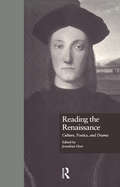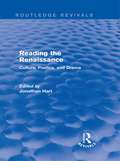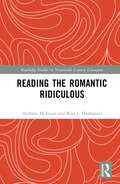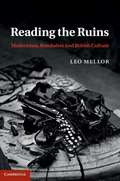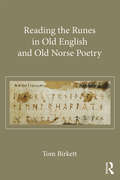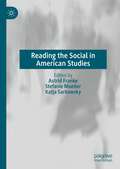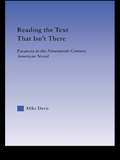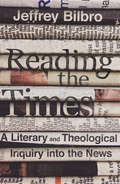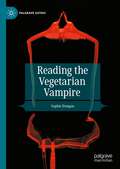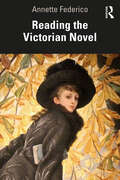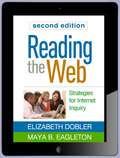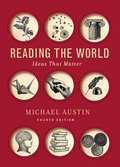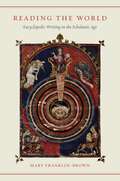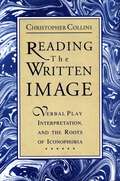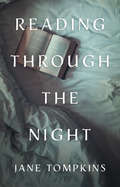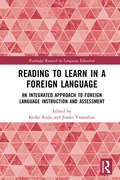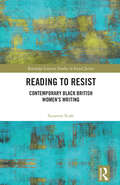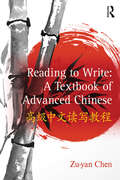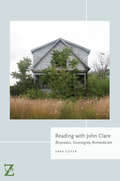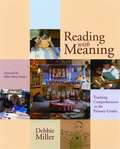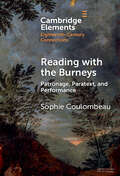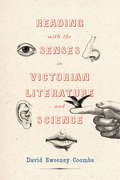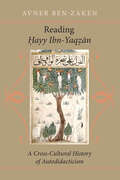- Table View
- List View
Reading the Renaissance: Culture, Poetics, and Drama (Garland Studies in the Renaissance)
by Jonathan HartFirst published in 1996. Routledge is an imprint of Taylor & Francis, an informa company.
Reading the Renaissance: Culture, Poetics, and Drama (Routledge Revivals #4)
by Jonathan HartReading the Renaissance, first published in 1996, is a collection of essays discussing the literature, drama, poetics and culture of the Renaissance period. The Renaissance, which extends from about 1300 to 1700 depending on the country, was originally a rebirth of the arts but has also come to apply to the wider cultural change in the face of modernization. The essays represent a plural Renaissance and explore the boundaries between genre and gender, languages and literatures, reading and criticism, the Renaissance and the medieval, the early modern and the postmodern, world and theatre. There is also a plurality of methods that is fitting for the variety of topics and the richness of the Renaissance. This book is ideal for students of literature and theatre studies.
Reading the Romantic Ridiculous (Routledge Studies in Nineteenth Century Literature)
by Andrew McInnes Rita J. DashwoodReading The Romantic Ridiculous aims to take Romantic Studies from the sublime to the ridiculous. Building on recent work that decentres the myth of the solitary genius, this duograph theorises the ridiculous as an alternative affect to the sublime, privileging collective laughter above solitude and selfishness and reflecting on these ideals through the practice of joint authorship. Tracing the history of the ridiculous through Romantic and post-Romantic debates about sublimity, from the rediscovery of Longinus and the aesthetic theories of Burke and Kant to contemporary queer and postcolonial theory interested in silliness, lowness, and vulnerability, Reading the Romantic Ridiculous explores Romanticism's surprising commitments to ridiculousness in canonical material by writers such as Samuel Taylor Coleridge, Jane Austen, and Charles Lamb as well as lesser-known material from joke books to children's literature. In theory and practice, this duograph also considers the legacies of Romanticism – and ridiculousness – today, analysing their influence on independent film, sitcoms, and young adult fiction, as well as their place in higher education now.
Reading the Ruins
by Leo MellorFrom fires to ghosts, and from flowers to surrealist apparitions, the bombsites of London were both unsettling and inspiring terrains. Yet throughout the years prior to the Second World War, British culture was already filled with ruins and fragments. They appeared as content, with visions of tottering towers and scraps of paper; and also as form, in the shapes of broken poetics. But from the outbreak of the Second World War what had been an aesthetic mode began to resemble a proleptic template. During that conflict many modernist writers - such as Graham Greene, Louis MacNeice, David Jones, J. F. Hendry, Elizabeth Bowen, T. S. Eliot and Rose Macaulay - engaged with devastated cityscapes and the altered lives of a nation at war. To understand the potency of the bombsites, both in the Second World War and after, Reading the Ruins brings together poetry, novels and short stories, as well as film and visual art.
Reading the Runes in Old English and Old Norse Poetry
by Thomas BirkettReading the Runes in Old English and Old Norse Poetry is the first book-length study to compare responses to runic heritage in the literature of Anglo-Saxon England and medieval Iceland. The Anglo-Saxon runic script had already become the preserve of antiquarians at the time the majority of Old English poetry was written down, and the Icelanders recording the mythology associated with the script were at some remove from the centres of runic practice in medieval Scandinavia. Both literary cultures thus inherited knowledge of the runic system and the traditions associated with it, but viewed this literate past from the vantage point of a developed manuscript culture. <P><P> There has, as yet, been no comprehensive study of poetic responses to this scriptural heritage, which include episodes in such canonical texts as Beowulf, the Old English riddles and the poems of the Poetic Edda. By analysing the inflection of the script through shared literary traditions, this study enhances our understanding of the burgeoning of literary self-awareness in early medieval vernacular poetry and the construction of cultural memory, and furthers our understanding of the relationship between Anglo-Saxon and Norse textual cultures. The introduction sets out in detail the rationale for examining runes in poetry as a literary motif and surveys the relevant critical debates. The body of the volume is comprised of five linked case studies of runes in poetry, viewing these representations through the paradigm of scriptural reconstruction and the validation of contemporary literary, historical and religious sensibilities.
Reading the Social in American Studies
by Katja Sarkowsky Astrid Franke Stefanie MuellerReading the Social in American Studies offers a unique exploration of the advantages and benefits in using sociological terms and concepts in American literary and cultural studies and, conversely, in using literature—understood broadly—to uncover a microlevel of the social. Its temporal scope ranges from the early 19th to the 21st century, providing a historical dimension that is otherwise often missing from studies on the conjunction of literature and sociology. The contributors’ approaches include genre reflections as well as close readings, theoretical discussions of crucial sociological terms, and literary observations backed up by empirical sociological studies. The book will familiarize international readers with ideas on the social from both sides of the Atlantic, including scholarship of such figures as John Dewey, Georg Simmel, Norbert Elias, and Pierre Bourdieu.
Reading the Text That Isn't There: Paranoia in the Nineteenth-Century Novel (Literary Criticism and Cultural Theory)
by Mike DavisThrough a careful examination of the work of the canonical nineteenth-century novelists, Mike Davis traces conspiracies and conspiratorial fantasy from one narrative site to another.
Reading the Times: A Literary and Theological Inquiry into the News
by Jeffrey Bilbro"Reading the morning newspaper is the realist's morning prayer."—G. W. F. Hegel Whenever we reach for our phones or scan a newspaper to get "caught up," we are being not merely informed but also formed. News consumption can shape our sense of belonging, how we judge the value of our lives, and even how our brains function. Christians mustn't let the news replace prayer as Hegel envisioned, but neither should we simply discard the daily feed. We need a better understanding of what the news is for and how to read it well. Jeffrey Bilbro invites readers to take a step back and gain some theological and historical perspective on the nature and very purpose of news. In Reading the Times he reflects on how we pay attention, how we discern the nature of time and history, and how we form communities through what we read and discuss. Drawing on writers from Thoreau and Dante to Merton and Berry, along with activist-journalists such as Frederick Douglass and Dorothy Day, Bilbro offers an alternative vision of the rhythms of life, one in which we understand our times in light of what is timeless. Throughout, he suggests practices to counteract common maladies tied to media consumption in order to cultivate healthier ways of reading and being. When the news sets itself up as the light of the world, it usurps the role of the living Word. But when it helps us attend together to the work of Christ—down through history and within our daily contexts—it can play a vital part in enabling us to love our neighbors. Reading the Times is a refreshing and humane call to put the news in its place.
Reading the Vegetarian Vampire (Palgrave Gothic)
by Sophie DunganThis Pivot traces the rise of the so-called “vegetarian” vampire in popular culture and contemporary vampire fiction, while also exploring how the shift in the diet of (some) vampires, from human to animal or synthetic blood, responds to a growing ecological awareness that is rapidly reshaping our understanding of relations with others species. The book introduces the trope of the vegetarian vampire, as well as important critical contexts for its discussion: the Anthropocene, food studies, and the modern practice, politics and ideologies of vegetarianism. Drawing on references to recent historical contexts and developments in the genre more broadly, the book investigates the vegetarian vampire’s relationship to other more violent and monstrous forms of the vampire in popular twenty-first century horror cinema and television. Texts discussed include Interview with the Vampire, Buffy the Vampire Slayer, Twilight, The Vampire Diaries and True Blood. Reading the Vegetarian Vampire examines a new aspect of contemporary interest in considering vampire fiction.
Reading the Victorian Novel
by Annette FedericoReading the Victorian Novel is a clear and engaging introduction to Victorian fiction. In this book, Annette Federico invites readers to turn their attention to the bursting imaginations and formal inventiveness of Victorian novelists themselves. Five conventions prevailed in the building of a Victorian novel: serialisation, narration, plotting, description, and characterization. Each chapter is rich in examples of these practices and attentive to the historical and cultural contexts that shaped them, as well as to the responses and judgments of Victorian readers and contemporary scholars. Federico keeps the focus on the writer’s choices and the reader’s experience––on the meeting of minds and imaginations against the backdrop of history. Reading the Victorian Novel is an appreciative and discerning guide for anyone with an interest in the resonant and vibrant worlds of nineteenth-century fiction.
Reading the Victory Ode
by Chris Carey Peter Agócs Chris Carey Richard Rawles Peter AgócsThe victory ode was a short-lived poetic genre in the fifth century BC, but its impact has been substantial. Pindar, Bacchylides and others are now among the most widely read Greek authors precisely because of their significance for the literary development of poetry between Homer and tragedy and their historical involvement in promoting Greek rulers. Their influence was so great that it ultimately helped to define the European notion of lyric from the Renaissance onwards. This collection of essays by international experts examines the victory ode from a range of angles: its genesis and evolution, the nature of the commissioning process, the patrons, context of performance and re-performance, and the poetics of the victory ode and its exponents. From these different perspectives the contributors offer both a panoramic view of the genre and an insight into the modern research positions on this complex and fascinating subject.
Reading the Web, Second Edition
by Maya B. Eagleton Elizabeth Dobler Donald J. LeuToday's students need to know how to locate, comprehend, evaluate, and use online information efficiently and effectively. This widely used teacher guide and course text provides a framework for maximizing students' critical, creative use of the Web in grades 3-8. Research-based strategies for instruction and assessment across the content areas are clearly explained and linked to the Common Core State Standards (CCSS). In a large-size format for easy photocopying, the book is packed with graphics, sidebars, lesson plans, and more than 90 reproducible handouts. Purchasers get access to a Web page where they can download and print the reproducible materials. New to This Edition *Incorporates state-of-the-art research and Web resources. *Chapter on major Web 3.0 developments, such as the rise of social media and mobile devices. *Connections to the CCSS are identified throughout. *Stronger focus on Universal Design for Learning and differentiated instruction. *Larger format facilitates photocopying of the updated reproducible tools.
Reading the World (Fourth Edition)
by Michael AustinThe only global great ideas reader, with new chapters on Ethics & Empathy and Visual Arguments With 77 readings by some of the world’s great thinkers, Reading the World is the only great ideas reader to offer a global perspective, allowing students to explore the development of ideas across cultures, an increasingly important approach in our diverse society. Selections strike a balance between Western and non-Western, classic and contemporary, verbal and visual, and longer and shorter. The new edition features a new chapter on Ethics & Empathy, a new casebook on Visual Arguments, 36 new readings in total, and new guidance on identifying and avoiding bias. This purchase offers access to the digital ebook only.
Reading the World: Encyclopedic Writing in the Scholastic Age
by Mary Franklin-BrownThe thirteenth century saw such a proliferation of new encyclopedic texts that more than one scholar has called it the "century of the encyclopedias. " Variously referred to as a speculum, thesaurus, or imago mundi--the term encyclopedia was not commonly applied to such books until the eighteenth century--these texts were organized in such a way that a reader could easily locate a collection of authoritative statements on any given topic. Because they reproduced, rather than simply summarized, parts of prior texts, these compilations became libraries in miniature. In this groundbreaking study, Mary Franklin-Brown examines writings in Latin, Catalan, and French that are connected to the encyclopedic movement: Vincent of Beauvais's Speculum maius; Ramon Llull's Libre de meravelles, Arbor scientiae, and Arbre de filosofia d'amor; and Jean de Meun's continuation of the Roman de la Rose. Franklin-Brown analyzes the order of knowledge in these challenging texts, describing the wide-ranging interests, the textual practices--including commentary, compilation, and organization--and the diverse discourses that they absorb from preexisting classical, patristic, and medieval writing. She also demonstrates how these encyclopedias, like libraries, became "heterotopias" of knowledge--spaces where many possible ways of knowing are juxtaposed. But Franklin-Brown's study will not appeal only to historians: she argues that a revised understanding of late medievalism makes it possible to discern a close connection between scholasticism and contemporary imaginative literature. She shows how encyclopedists employed the same practices of figuration, narrative, and citation as poets and romanciers, while much of the difficulty of the imaginative writing of this period derives from a juxtaposition of heterogeneous discourses inspired by encyclopedias. With rich and innovative readings of texts both familiar and neglected, Reading the World reveals how the study of encyclopedism can illuminate both the intellectual work and the imaginative writing of the scholastic age.
Reading the World: Encyclopedic Writing in the Scholastic Age
by Mary Franklin-BrownThe thirteenth century saw such a proliferation of new encyclopedic texts that more than one scholar has called it the “century of the encyclopedias.” Variously referred to as a speculum, thesaurus, or imago mundi—the term encyclopedia was not commonly applied to such books until the eighteenth century—these texts were organized in such a way that a reader could easily locate a collection of authoritative statements on any given topic. Because they reproduced, rather than simply summarized, parts of prior texts, these compilations became libraries in miniature. In this groundbreaking study, Mary Franklin-Brown examines writings in Latin, Catalan, and French that are connected to the encyclopedic movement: Vincent of Beauvais’s Speculum maius; Ramon Llull’s Libre de meravelles, Arbor scientiae, and Arbre de filosofia d’amor; and Jean de Meun’s continuation of the Roman de la Rose. Franklin-Brown analyzes the order of knowledge in these challenging texts, describing the wide-ranging interests, the textual practices—including commentary, compilation, and organization—and the diverse discourses that they absorb from preexisting classical, patristic, and medieval writing. She also demonstrates how these encyclopedias, like libraries, became “heterotopias” of knowledge—spaces where many possible ways of knowing are juxtaposed. But Franklin-Brown’s study will not appeal only to historians: she argues that a revised understanding of late medievalism makes it possible to discern a close connection between scholasticism and contemporary imaginative literature. She shows how encyclopedists employed the same practices of figuration, narrative, and citation as poets and romanciers, while much of the difficulty of the imaginative writing of this period derives from a juxtaposition of heterogeneous discourses inspired by encyclopedias. With rich and innovative readings of texts both familiar and neglected, Reading the World reveals how the study of encyclopedism can illuminate both the intellectual work and the imaginative writing of the scholastic age.
Reading the Written Image: Verbal Play, Interpretation, and the Roots of Iconophobia (G - Reference, Information and Interdisciplinary Subjects)
by Christopher CollinsReading the Written Image is a study of the imagination as it is prompted by the verbal cues of literature. Since every literary image is also a mental image, a representation of an absent entity, Collins contends that imagination is a poiesis, a making-up, an act of play for both author and reader. The "willing suspension of disbelief," which Coleridge said "constitutes poetic faith," therefore empowers and directs the reader to construct an imagined world in which particular hypotheses are proposed and demonstrated.Although the imagination as a central concept in poetics emerges into critical debate only in the eighteenth century, it has been a crucial issue for over two millennia in religious, philosophical, and political discourse. The two recognized alternative methodologies in the study of literature, the poetic and the hermeneutic, are opposed on the issue of the written image: poets and readers feel free to imagine, while hermeneuts feel obliged to specify the meanings of images and, failing that, to minimize the importance of imagery. Recognizing this problem, Collins proposes that reading written texts be regarded as a performance, a unique kind of play that transposes what had once been an oral-dramatic situation onto an inner, imaginary stage. He applies models drawn from the psychology of play to support his theory that reader response is essentially a poietic response to a rule-governed set of ludic cues.
Reading through the Night
by Jane TompkinsJane Tompkins, a renowned literature professor and award-winning author, thought she knew what reading was until, struck by a debilitating illness, she finds herself reading day and night because it is all she can do. A lifelong lover of books, she realizes for the first time that if you pay close attention to your reactions as you read, literature can become a path of self-discovery. Tompkins’s inner journey begins when she becomes captivated unexpectedly by an account of friendship between two writers to whom she’d given little thought, Paul Theroux and V. S. Naipaul. Theroux’s memoir launches her on a path of introspection that stretches back to the first weeks of her life in a Bronx hospital, and forward to her relationship with her mother and the structure of her present marriage. Her reading experience, intensified by the feelings of powerlessness and loss of self that come with chronic illness, expands to include writers such as Henning Mankell and Ann Patchett, Alain de Botton, Elena Ferrante, and Anthony Trollope. As she makes her way through their books, she recognizes herself in them, stumbling across patterns of feeling and behavior that have ruled her without her knowing it—envy, a desire for fame, fear of confronting the people she loves, a longing for communion. The reader, along with Tompkins, comes to the realization that literature can be not only a source of information and entertainment, not only a balm and a refuge, but also a key to unlocking long-forgotten memories that lead to a new understanding of one’s life.
Reading to Learn in a Foreign Language: An Integrated Approach to Foreign Language Instruction and Assessment (Routledge Research in Language Education)
by Keiko Koda Junko YamashitaThis book describes a theory-guided approach to Foreign Language (FL) course development, implementation, instruction and assessment. It documents the development and implementation of a theory-guided approach designed to exploit cross-linguistically sharable competencies as resources for promoting FL learning. The volume delineates the processes of (a) identifying cross-linguistically sharable competencies, (b) exploring ways of exploiting sharable competencies as resources in promoting language skills through their purposeful use for content learning, (c) implementing the instructional approach in multiple EFL classrooms, and (d) evaluating the approach by comparing learning outcomes across classrooms. It presents a solid conceptual framework that integrates theories in multiple research domains, including second language acquisition, knowledge acquisition, and language assessment. It also provides detailed descriptions of framework construction and classroom implementation – the two processes that are integral to course design and development.
Reading to Resist: Contemporary Black British Women’s Writing (Routledge Literary Studies in Social Justice)
by Suzanne ScafeThis is the first book to focus on writing by black British women writers, using an approach that highlights the potential of this fiction to intervene into discourses that shape the worlds in which it is situated.Reading to Resist: Contemporary Black British Women's Writing undertakes a close, innovative reading of the novels selected, one that focuses on the texts’ aesthetics as well as their thematic engagement with the worlds of their readers and the worlds the texts themselves construct. Each chapter examines themes such as freedom and agency, moral understanding, and history, while also exploring issues of importance to the contemporary period such as well-being, success, and achievement. Reading to Resist: Contemporary Black British Women's Writing covers a broad range of texts including the work of internationally acclaimed writers such as Nadifa Mohamed, Zadie Smith, Diana Evans and Buchi Emecheta, as well as work by much less well-known writers such as Jacqueline Walker, Yvvette Edwards, and Jacqueline Roy.
Reading to Write: A Textbook Of Advanced Chinese
by Zu-Yan ChenTraditionally, reading and writing are believed to be separate but related language processes and teachers follow the conventional wisdom of teaching in-depth reading, with writing as a tag-on issue. Therefore, there exists an increasingly urgent call for a well-rounded reading-writing curriculum and a theoretically-informed, empirically-based, student-centered advanced textbook that aims to develop the synergy between reading and writing. Reading to Write: A Textbook of Advanced Chinese is intended to fill this significant gap. It treats reading and writing as integrative parts and interactive skills in Chinese language teaching, putting them hand-in-hand, supplementing each other.
Reading with John Clare: Biopoetics, Sovereignty, Romanticism (Lit Z)
by Sara GuyerReading with John Clare argues that at the heart of contemporary biopolitical thinking is an insistent repression of poetry. By returning to the moment at which biopolitics is said to emerge simultaneously with romanticism, this project renews our understanding of the operations of contemporary politics and its relation to aesthetics across two centuries.Guyer focuses on a single, exemplary case: the poetry and autobiographical writing of the British poet John Clare (1793–1864). Reading Clare in combination with contemporary theories of biopolitics, Guyer reinterprets romanticism’s political legacies, specifically the belief that romanticism is a direct precursor to the violent nationalisms and redemptive environmentalisms of the twentieth and twenty-first centuries.Guyer offers an alternative account of many of romanticism’s foundational concepts, like home, genius, creativity, and organicism. She shows that contemporary critical theories of biopolitics, despite repeatedly dismissing the aesthetic or poetic dimensions of power as a culpable ideology, emerge within the same rhetorical tradition as the romanticism they denounce. The book thus compels a rethinking of the biopolitical critique of poetry and an attendant reconsideration of romanticism and its concepts.
Reading with Meaning: Teaching Comprehension in the Primary Grades
by Debbie S. MillerIf you have ever wondered how to teach comprehension strategies to primary-age children, read on. First, imagine a primary-grade classroom where all the children are engaged and motivated; where the buzz of excited, emerging readers fills the air; where simultaneously words are sounded out and connections are made between the books of their choice and the experiences of their lives. Then, open these pages. Welcome to Debbie Miller's real classroom where real students are learning to love to read, to write, and are together creating a collaborative and caring environment. In this book, Debbie focuses on how best to teach children strategies for comprehending text. She leads the reader through the course of a year showing how her students learn to become thoughtful, independent, and strategic readers. Through explicit instruction, modeling, classroom discussion, and, most important, by gradually releasing responsibility to her students, Debbie provides a model for creating a climate and culture of thinking and learning. Here you will learn: techniques for modeling thinking; specific examples of modeled strategy lessons for inferring, asking questions, making connections, determining importance in text, creating mental images, and synthesizing information; how to help children make their thinking visible through oral, written, artistic, and dramatic responses to literature; how to successfully develop book clubs as a way for children to share their thinking. Reading with Meaning shows you how to bring your imagined classroom to life. You will emerge with new tools for teaching comprehension strategies and a firm appreciation that a rigorous classroom can also be nurturing and joyful.
Reading with the Burneys: Patronage, Paratext, and Performance (Elements in Eighteenth-Century Connections)
by Sophie CoulombeauThis Element offers a multidimensional study of reading practice and sibling rivalry in late eighteenth-century Britain. The case study is the Aberdeen student and disgraced thief Charles Burney's treatment of Evelina (1778), the debut novel of his sister Frances Burney. Coulombeau uses Charles's manuscript poetry, letters, and marginalia, alongside illustrative prints and circulating library archives, to tell the story of how he attempted to control Evelina's reception in an effort to bolster his own socio-literary status. Uniting approaches drawn from literary studies, biography, bibliography, and the history of the book, the Element enriches scholarly understanding of the reception of Frances Burney's fiction, with broader implications for studies of gender, class, kinship and reading in this period. This title is also available as Open Access on Cambridge Core.
Reading with the Senses in Victorian Literature and Science (Victorian Literature and Culture Series)
by David Sweeney CoombsThe nineteenth-century sciences cleaved sensory experience into two separate realms: the bodily physics of sensation and the mental activity of perception. This division into two discrete categories was foundational to Victorian physics, physiology, and experimental psychology. As David Sweeney Coombs reveals, however, it was equally important to Victorian novelists, aesthetes, and critics, for whom the distinction between sensation and perception promised the key to understanding literature’s seemingly magical power to conjure up tastes, sights, touches, and sounds from the austere medium of print. In Victorian literature, science, and philosophy, the parallel between reading and perceiving gave rise to momentous debates about description as a mode of knowledge as well as how, and even whether, reading about the world differs from experiencing it firsthand.Examining novels and art criticism by George Eliot, Thomas Hardy, Vernon Lee, and Walter Pater alongside scientific works by Hermann von Helmholtz, William James, and others, this book shows how Victorian literature offers us ways not just to touch but to grapple with the material realities that Clifford Geertz called the "hard surfaces of life."
Reading Ḥayy Ibn-Yaqẓān: A Cross-Cultural History of Autodidacticism
by Avner Ben-ZakenCommonly translated as "The Self-Taught Philosopher" or "The Improvement of Human Reason," Ibn-Tufayl's story Hayy Ibn-Yaqzān inspired debates about autodidacticism in a range of historical fields from classical Islamic philosophy through Renaissance humanism and the European Enlightenment. Avner Ben-Zaken's account of how the text traveled demonstrates the intricate ways in which autodidacticism was contested in and adapted to diverse cultural settings.In tracing the circulation of the Hayy Ibn-Yaqzān, Ben-Zaken highlights its key place in four far-removed historical moments. He explains how autodidacticism intertwined with struggles over mysticism in twelfth-century Marrakesh, controversies about pedagogy in fourteenth-century Barcelona, quarrels concerning astrology in Renaissance Florence, and debates pertaining to experimentalism in seventeenth-century Oxford. In each site and period, Ben-Zaken recaptures the cultural context that stirred scholars to relate to ayy Ibn-Yaqān and demonstrates how the text moved among cultures, leaving in its wake translations, interpretations, and controversies as various as the societies themselves. Pleas for autodidacticism, Ben-Zaken shows, not only echoed within close philosophical discussions; they surfaced in struggles for control between individuals and establishments. Presented as self-contained histories, these four moments together form a historical collage of autodidacticism across cultures from the late Medieval era to early modern times. The first book-length intellectual history of autodidacticism, this novel, thought-provoking work will interest a wide range of historians, including scholars of the history of science, philosophy, literature, Europe, and the Middle East.
